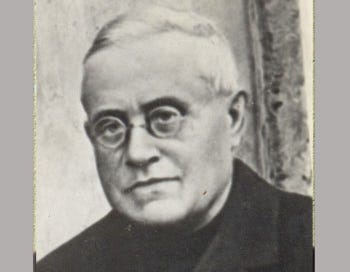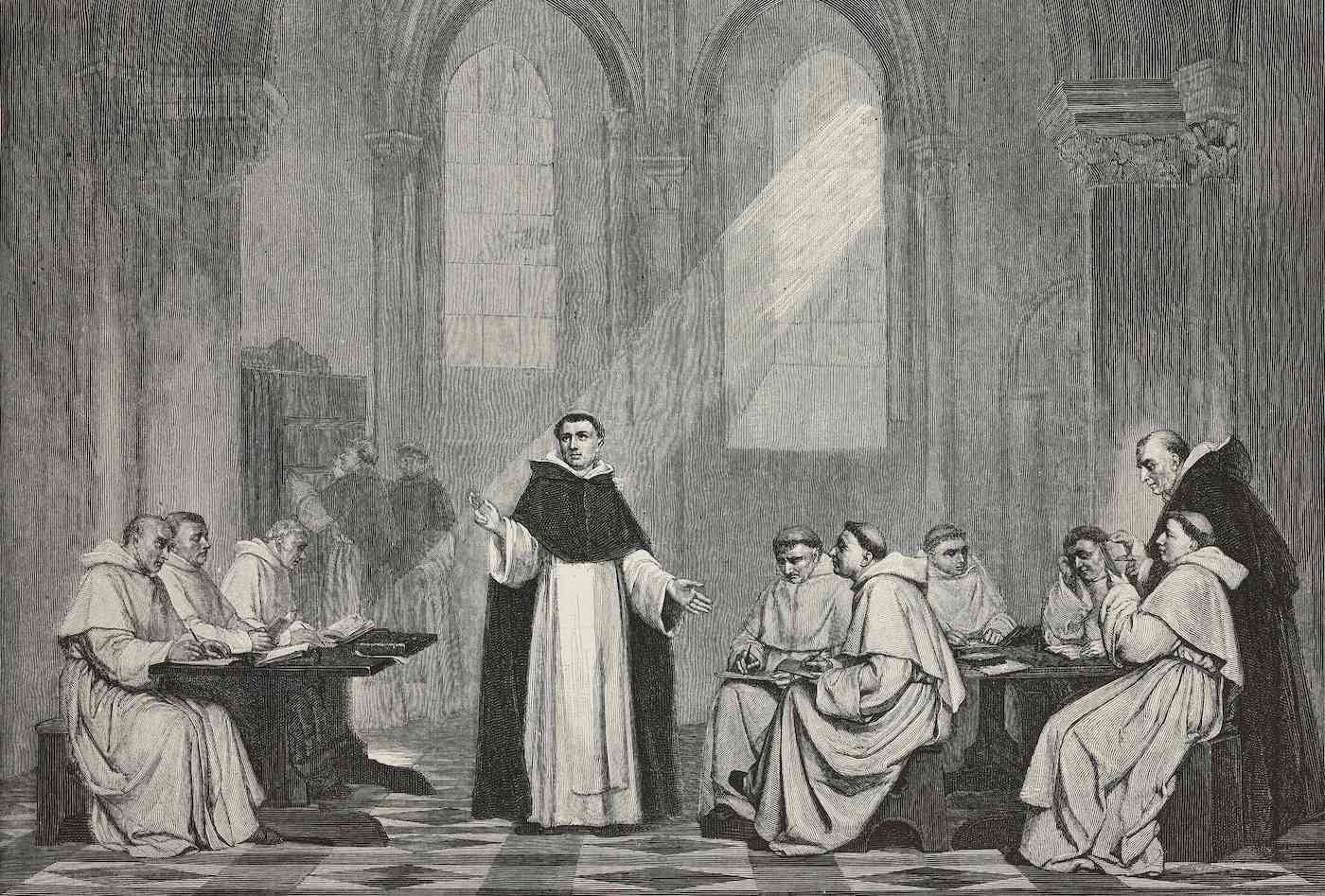What is Moral Theology?
A Brief Definition and Division of Moral Theology According to Heinrich Merkelbach and Bl. Ferreres
[The Following is an Excerpt and Abruptly Ends]
When we consider human actions according to their moral nature, we are essentially evaluating them according to certain customs or laws. Either in the respect they are considered according to pre-established human rules, or laws which God has ordained for the good of man. Human actions as either morally praiseworthy or reprehensible tend to be those that we believe reflect the truest expression of what it is to act as a Human Person. However, this consideration extends beyond secular ethics into the realm of Moral Theology. As theologians, we recognize an additional dimension beyond the mere application of reason to adhere to a 'law', so to speak. We understand that God is the ultimate point of rest, as eloquently expressed in St. Augustine's famous quote, “I am restless until I rest in you, Lord”. Whether we examine the works of Aristotle, Aquinas, or Ficino, our theological discourse is invariably directed towards the divine. Although my intention is to briefly cover moral theology, I shall omit certain background information for the sake of concision. It is crucial, therefore, to distinguish theology in a particular respect, one best articulated by Benedictus Heinrich Merkelbach:
“Complectitur theologia duplicem partem: una est mere speculativa: de Deo in seet ut est principium et finis rerum, quae agit de Deo in se uno et trino, et de ipsius operibus ad extra, praesertim de homine quem destinavit Deus ad finem supernaturalem : visionem sui intuitivam, in quam homo pervenire potest per divinam gratiam, quam nobis largitur Christus. Ex hoc? sponte nascitur altera pars Practica: si enim Deus est nostri principium et finis, sequuntur in nobis erga eum officia; debemus scil. eum auctorem nostri agnoscere, et ad eum finem ultimum tendere. Haec immediate agit de actibus humanis quibus in Deum tendimus, et etiam, sed consequenter, de ipsorum regulis et principiis”.
Moral Theology, according to Merkelbach, is more aptly categorised under Practical Theology rather than Speculative Theology. As a part of theological science, it is expressed as a science based on certain knowledge derived from specific principles. The concept of “science” here can be understood in three ways: (i) as an act or operation, (ii) as a habit, or (iii) as a system. Merkelbach appears to employ the first definition, which Henri Grenier elucidates as “certain knowledge through causes…knowledge of the cause of the affirmation, in a demonstration of the mere existence of truth… [or] knowledge of the proper cause formally as such… [or] a necessary nexus between the cause and the effect…”. The certain principles that define this knowledge “through causes” are revealed principles, guiding us towards our supernatural end. As with every science, theological science has a proper object. It is distinguished from what some contemporaries might term “Ethics” because its principles are derived from revelation, not solely from natural reason (although, acknowledging the role of Natural Theology). Given that it is “theological” due to its basis in revealed principles, the object of this practical-theological science must be specified by the end of its practice. Consequently, the material object of Morals falls under the scope of Human Acts, as these concern the entire breadth of the science. Grenier articulates this object clearly: “Hence the operables with which a practical science deals constitute its material object; these operables as directed to an end constitute its formal object quod; and the end itself is the formal object quo, for a practical science deals with things subordinated to an end from which they have their unity”.
Moral Theology is considered a part of theological science not because it is differentiated by species, but because it is an integrally constitutive part of Theology. Merkelbach argues that, unlike in Philosophy, there are not various sciences within Theology. Instead, there is one science of Theology because there is one formal object to which it is directed, namely revelation, and therefore one subject: God. When discussing Moral Theology specifically, we speak of one subject and one formal object by which the whole theological science is oriented. However, the distinction between practical and speculative theology lies in the manner by which the science is conducted. Moral Theology, as a practical-theological science, has as its material object all operables. It is determined by its end, which is a supernatural order. Merkelbach succinctly expresses this as “ad Deum finem ultimum supernaturalem ordinandis…” (ordering towards God as the ultimate supernatural end). According to Ferreres, Moral Theology concerns Human Acts insofar as they are supernaturally ordered to their “formal object quo” (the formal object by which). As a means of this Ferreres states that the revealed principles and laws are used towards this ultimate end.
In Moral Theology, Ferreres distinguishes two main divisions: (i) fundamental Moral Theology; and (ii) special Moral Theology. The former addresses the general principles of Human Acts as they are ordered to their ultimate end [finem ultimum], while the latter deals with specifics such as virtues, Sacramentology, and Ecclesiology. Fundamental Moral Theology establishes the basic principles for conducting specific aspects. Consequently, these fundamentals should precede any area of specialisation. To provide a comprehensive overview of the fundamentals, it is beneficial to first examine the material object of this science. Understanding the will, its functions, and the various distinctions drawn by moral theologians is crucial for grasping the fundamentals that prepare us for more advanced concepts. Fr. Dominic Prummer offers one of the more concise treatments on this topic, which I will compare to the perspectives of the two theologians previously mentioned. Human acts are defined in three ways: (i) deliberative acts, (ii) acts proceeding from knowledge of the intellect and impulse of the will, or (iii) acts in which man is entirely the master. In contrast, “acts of man”, such as hunger arising from our vegetative faculty, are not considered Human Acts. This distinction may seem peculiar, as one might assume that acts of man and human acts are merely nominally distinct. However, the distinction is not nominal but rather signifies a concept Aristotle specified as real. Josephus Gredt, in his Elementa, describes the vegetative soul as comprising various functions by which a thing acts upon itself, consuming and utilising energies, growing, and reproducing. Since man possesses both vegetative and sensitive souls, these acts are attributed to man. Thus, “acts of man” is an appropriate term for the indeliberate acts associated with human beings.
Now, in any given science it is a given that we have a kind of method by which we conduct it. Merkelbach lists at least three: (i) a positive method; (ii) a Scholastic method; and (iii) a practical-casuisastic method. One might think because we have defined Moral Theology as a practical science that what follows must be a practical method, but this is not necessarily the case. All Merkelbach is arguing here is that the first derives proofs from the documents of revelation, the second organises, as well as illustrates principles and establishes conclusions according to reason; the third is merely the concrete application of moral principles. In light of this, it is evident why Merkelbach suggests that all three methods be used in order to treat Moral Theology comprehensively. In this sense, Moral Theology can be split either into fundamental or special, but remains a comprehensively Practical Theology that uses a nexus of methodology in the various divisions of its science. It remains a science which deals in Human Acts, which are deliberative acts that orient themselves to their proper end in accordance with the specifics of revealed principles. In this manner, Moral Theology is the most complete form of “Ethics”, because it elevates, through the formal object by which, a higher end. An end which John of St. Thomas, in his Cursus Theologicus, describes as a higher point of perfection in which the thing (not only the will, but the whole person) rests in enjoyment of the end it achieved.





